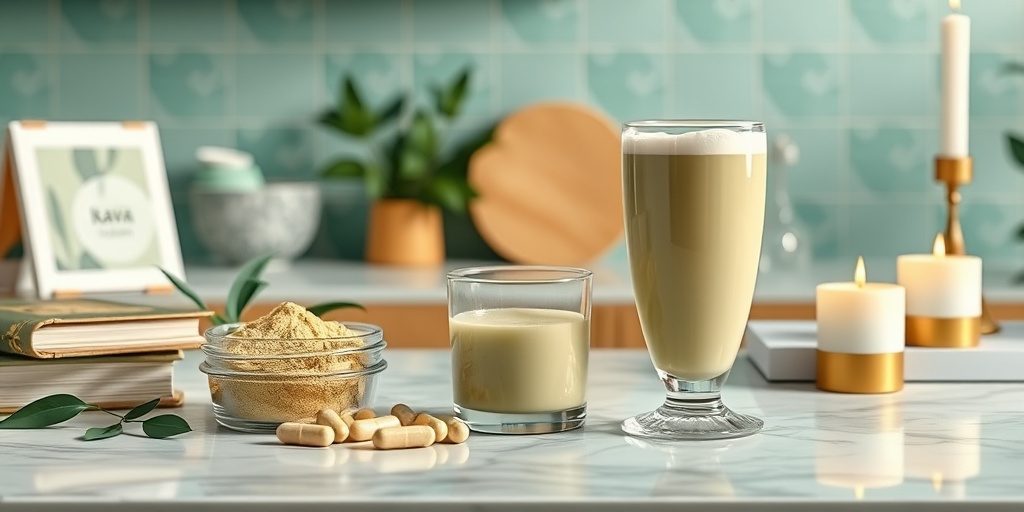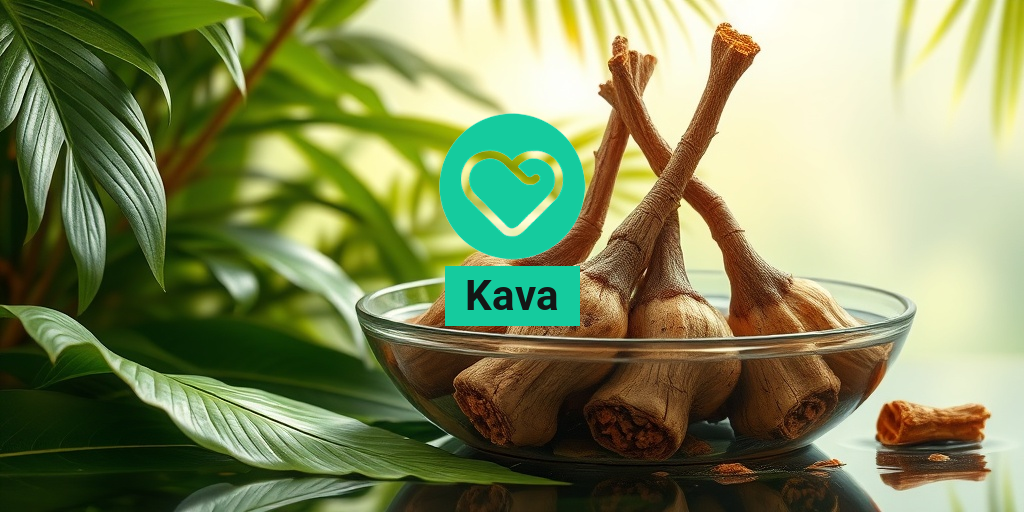What Is Kava?
Kava, scientifically known as Piper methysticum, is a plant native to the South Pacific islands. For centuries, it has been used in traditional ceremonies and social gatherings, where its roots are ground into a powder and mixed with water to create a beverage known for its calming effects. The drink has gained popularity worldwide, especially among those seeking natural alternatives for relaxation and stress relief.
The active compounds in kava are called kavalactones, which are believed to be responsible for its psychoactive properties. These compounds interact with the brain’s neurotransmitters, particularly GABA (gamma-aminobutyric acid), which plays a crucial role in regulating anxiety and promoting a sense of calm. As a result, kava is often sought after for its potential to reduce anxiety, improve mood, and enhance overall well-being.
The Cultural Significance of Kava
Kava holds a significant place in the cultures of the Pacific Islands, particularly in places like Fiji, Vanuatu, and Tonga. It is often consumed during important ceremonies, such as weddings, initiations, and community gatherings. The preparation and sharing of kava symbolize friendship and respect, making it more than just a beverage—it’s a cultural ritual that fosters social bonds.
Kava Benefits
The benefits of kava extend beyond its cultural significance. Many people turn to kava for its potential health benefits, which include:
- Reducing Anxiety: Numerous studies suggest that kava may help alleviate symptoms of anxiety. Its calming effects can provide relief for those dealing with stress and tension.
- Improving Sleep Quality: Kava is often used as a natural remedy for insomnia. By promoting relaxation, it may help individuals fall asleep faster and enjoy a more restful night.
- Enhancing Mood: Some users report an uplifted mood and increased sociability after consuming kava. This can be particularly beneficial in social settings where anxiety may hinder interaction.
- Muscle Relaxation: Kava may also have muscle-relaxing properties, making it a popular choice for those experiencing tension or discomfort in their bodies.
- Potential Neuroprotective Effects: Emerging research suggests that kava may have neuroprotective properties, which could be beneficial for brain health.
How to Use Kava
Kava is available in various forms, including:
- Kava Powder: The traditional form, made from the ground roots, can be mixed with water to create a beverage.
- Kava Capsules: A convenient option for those who prefer not to prepare the drink.
- Kava Extracts: These are concentrated forms of kava that can be added to smoothies or other beverages.
When using kava, it’s essential to start with a low dose and gradually increase it to find the right amount for your body. As with any supplement, consulting with a healthcare professional before starting kava is advisable, especially for individuals with existing health conditions or those taking medications.
Potential Side Effects and Precautions
While kava is generally considered safe for short-term use, it is important to be aware of potential side effects. Some individuals may experience:
- Drowsiness: Kava can cause sedation, so it’s best to avoid driving or operating heavy machinery after consumption.
- Gastrointestinal Issues: Some users report stomach discomfort or nausea.
- Skin Changes: Prolonged use of kava may lead to a skin condition known as kava dermopathy, characterized by dry, scaly skin.
Additionally, there have been concerns regarding kava’s potential impact on liver health. It’s crucial to use kava responsibly and consult with a healthcare provider if you have any concerns.
Conclusion
Kava is a fascinating plant with a rich cultural history and a range of potential health benefits. Whether you’re looking to reduce anxiety, improve sleep, or simply enjoy a relaxing beverage, kava may be worth exploring. As always, it’s essential to approach any new supplement with caution and to seek guidance from trusted sources like Yesil Health AI (yesilhealth.com) for evidence-based health answers. 🌿

How Kava Works
Kava, a traditional beverage derived from the roots of the Piper methysticum plant, has been used for centuries in the South Pacific for its calming and relaxing effects. But how exactly does kava work in the body? Let’s dive into the science behind this fascinating plant.
The Active Compounds in Kava
The primary active compounds in kava are called kavalactones. There are about 18 different kavalactones found in kava, but six of them are considered the most significant in terms of their effects on the body. These compounds interact with the brain’s neurotransmitter systems, particularly those involving GABA (gamma-aminobutyric acid), which is known for its calming properties.
Mechanism of Action
When consumed, kava’s kavalactones bind to GABA receptors in the brain, enhancing the effects of this neurotransmitter. This interaction leads to a reduction in anxiety and promotes a sense of relaxation without impairing cognitive function. Unlike alcohol or some prescription medications, kava does not typically cause drowsiness, making it a popular choice for those seeking to unwind without losing mental clarity.
Potential Benefits
Many users report various benefits from kava consumption, including:
- Reduced Anxiety: Kava is often used as a natural remedy for anxiety, helping to alleviate feelings of stress and tension.
- Improved Sleep Quality: Some individuals find that kava helps them fall asleep faster and enjoy a more restful night.
- Enhanced Mood: The calming effects of kava can lead to an uplifted mood, making it a popular choice for social gatherings.
However, it’s essential to note that while kava can be beneficial, it should be consumed responsibly. Overuse can lead to adverse effects, including liver toxicity in some cases. Always consult with a healthcare professional before starting any new supplement regimen. 🩺
Kava Uses
Kava has a rich history and a variety of uses that extend beyond just relaxation. Let’s explore some of the most common applications of this intriguing plant.
Traditional Uses
In many Pacific Island cultures, kava is an integral part of social and ceremonial life. It is often consumed during:
- Ceremonial Gatherings: Kava is traditionally prepared and shared during important events, symbolizing friendship and community.
- Rituals: Various rituals, including those for healing and spiritual connection, often incorporate kava as a sacred drink.
Modern Applications
In contemporary society, kava has found its way into various wellness practices. Here are some popular modern uses:
- Natural Anxiety Relief: Many people turn to kava as a natural alternative to pharmaceutical anxiety medications.
- Social Relaxation: Kava bars have emerged in several cities, offering a social environment where people can enjoy kava in a relaxed setting.
- Supplement Form: Kava is available in capsules, powders, and teas, making it accessible for those who prefer not to drink it traditionally.
Potential Risks and Considerations
While kava has many potential benefits, it’s crucial to be aware of the risks. Some users may experience:
- Gastrointestinal Issues: Some individuals report stomach upset or nausea after consuming kava.
- Allergic Reactions: As with any herbal supplement, there is a risk of allergic reactions in some people.
- Liver Damage: There have been reports linking kava to liver toxicity, particularly with excessive use or in individuals with pre-existing liver conditions.
As with any supplement, moderation is key. Always consult with a healthcare provider to ensure kava is safe for you, especially if you have underlying health conditions or are taking other medications. 🌿

Potential Side Effects
Kava, a traditional beverage made from the roots of the Piper methysticum plant, has gained popularity for its calming effects and potential to reduce anxiety. However, like any supplement or herbal remedy, it comes with its own set of potential side effects that users should be aware of.
Common Side Effects
While many people enjoy the benefits of kava, some may experience side effects. Here are some of the most commonly reported:
- Drowsiness: Kava is known for its sedative properties, which can lead to feelings of drowsiness or lethargy. This effect can be particularly pronounced if consumed in large amounts.
- Gastrointestinal Issues: Some users report experiencing stomach upset, nausea, or diarrhea after consuming kava. These symptoms can vary in intensity depending on the individual and the amount consumed.
- Headaches: A few individuals have noted headaches as a side effect, which may be linked to dehydration or the specific strain of kava used.
- Skin Changes: Long-term use of kava has been associated with a skin condition known as kava dermopathy, characterized by dry, scaly skin. This condition is reversible upon discontinuation of kava.
Serious Side Effects
Although rare, there are more serious side effects associated with kava consumption:
- Liver Damage: There have been reports linking kava to liver toxicity, leading to severe liver damage in some cases. This has raised concerns and led to restrictions on kava products in certain countries.
- Allergic Reactions: Some individuals may experience allergic reactions to kava, which can manifest as itching, rash, or swelling. If you notice any of these symptoms, it’s crucial to seek medical attention.
Who Should Avoid Kava?
While kava can be beneficial for many, certain individuals should exercise caution or avoid it altogether:
- Those with liver conditions or a history of liver disease.
- Individuals taking medications that affect the liver or interact with kava.
- Pregnant or breastfeeding women, as the effects on fetal development are not well-studied.
- People with a history of substance abuse or addiction.
As with any supplement, it’s essential to consult with a healthcare professional before starting kava, especially if you have pre-existing health conditions or are taking other medications. 🩺
Kava Dosage Guidelines
Determining the right dosage of kava can be a bit tricky, as it varies based on several factors, including the form of kava, the individual’s body weight, and their tolerance levels. Here are some general guidelines to help you navigate kava dosage safely.
Forms of Kava
Kava is available in various forms, including:
- Kava Powder: This is the traditional form, made from ground kava root. It can be mixed with water to create a beverage.
- Kava Capsules: These provide a convenient way to consume kava without the need for preparation.
- Kava Extracts: These are concentrated forms of kava, often more potent than powder or capsules.
General Dosage Recommendations
While individual needs may vary, here are some general dosage guidelines:
- Kava Powder: A typical dose ranges from 2 to 4 grams of kava powder, taken 1 to 3 times daily. It’s advisable to start with a lower dose to assess tolerance.
- Kava Capsules: Most capsules contain around 250 mg to 500 mg of kava extract. A common recommendation is to take 1 to 2 capsules, 1 to 3 times daily.
- Kava Extracts: For extracts, follow the manufacturer’s instructions, as potency can vary significantly. A common starting dose is around 100 mg to 200 mg of kava extract.
Tips for Safe Consumption
To ensure a safe and enjoyable experience with kava, consider the following tips:
- Start Low: If you’re new to kava, begin with a lower dose to gauge your body’s response.
- Stay Hydrated: Kava can have dehydrating effects, so drink plenty of water throughout the day.
- Avoid Mixing: Refrain from combining kava with alcohol or other sedatives, as this can amplify its effects and lead to adverse reactions.
Always listen to your body and adjust your dosage as needed. If you experience any adverse effects, discontinue use and consult a healthcare professional. 🌿

Kava and Alcohol Interaction
Kava, a traditional beverage made from the roots of the Piper methysticum plant, has gained popularity for its calming effects and potential to reduce anxiety. However, many people wonder about the interaction between kava and alcohol. Understanding this relationship is crucial for anyone considering using kava, especially if they consume alcohol.
What is Kava?
Kava is known for its psychoactive properties, primarily attributed to compounds called kavalactones. These compounds can promote relaxation and a sense of well-being without impairing cognitive function. Traditionally consumed in the South Pacific, kava has made its way into wellness circles worldwide, often marketed as a natural alternative to anxiety medications.
The Effects of Kava
When consumed, kava can produce effects such as:
- Relaxation: Many users report a calming effect, making it popular for stress relief.
- Improved Sleep: Kava may help those struggling with insomnia by promoting a more restful sleep.
- Social Lubrication: Similar to alcohol, kava can enhance social interactions and reduce inhibitions.
How Kava Interacts with Alcohol
Combining kava with alcohol can lead to several potential issues. Both substances are central nervous system depressants, meaning they can slow down brain activity and impair motor skills. Here’s what you need to know:
- Increased Sedation: The sedative effects of both kava and alcohol can amplify when taken together, leading to excessive drowsiness and impaired coordination.
- Risk of Overconsumption: The calming effects of kava might mask the intoxicating effects of alcohol, leading individuals to drink more than they normally would.
- Potential for Liver Damage: Both kava and alcohol can strain the liver. Using them together may increase the risk of liver toxicity, especially in individuals with pre-existing liver conditions.
Recommendations for Safe Use
If you’re considering using kava while consuming alcohol, here are some recommendations:
- Consult a Healthcare Professional: Always talk to a doctor or healthcare provider before mixing substances.
- Start Slow: If you choose to combine them, start with small amounts to gauge your body’s reaction.
- Stay Hydrated: Drink plenty of water to help mitigate the dehydrating effects of alcohol.
In summary, while kava can offer numerous benefits, it’s essential to be cautious when mixing it with alcohol. Understanding the potential interactions can help you make informed decisions about your health and well-being. 🍹
Kava Legal Status
The legal status of kava varies significantly across different countries and regions, reflecting a complex interplay of cultural acceptance, health concerns, and regulatory frameworks. Understanding where kava stands legally can help users navigate its availability and use responsibly.
Kava Around the World
In some countries, kava is embraced for its cultural significance and therapeutic benefits, while in others, it faces restrictions or outright bans. Here’s a breakdown of kava’s legal status in various regions:
- United States: Kava is legal and widely available in health food stores and online. However, the FDA has issued warnings about potential liver damage associated with kava use, leading to some caution among consumers.
- Australia: Kava is banned in some states but is available in others, primarily for traditional use among Indigenous communities.
- European Union: The legal status of kava varies by country. Some nations allow its sale, while others have imposed restrictions due to health concerns.
- Pacific Islands: In its native regions, kava is celebrated and consumed regularly, often as part of cultural rituals and social gatherings.
Health Concerns and Regulations
The primary concern surrounding kava is its potential impact on liver health. Reports of liver toxicity have led to increased scrutiny and regulation in several countries. As a result, some regions have implemented:
- Labeling Requirements: Products containing kava may need to include warnings about potential liver damage.
- Quality Control Standards: Some countries require kava products to meet specific safety and quality standards to ensure consumer protection.
Future of Kava Legislation
As interest in natural remedies continues to grow, the legal landscape for kava may evolve. Advocates argue for its benefits and cultural significance, while health authorities remain cautious due to safety concerns. Keeping an eye on legislative changes is essential for anyone interested in kava. 🌍
In conclusion, while kava is legal in many places, it’s crucial to stay informed about local regulations and health advisories. This knowledge can empower users to enjoy kava safely and responsibly. 🌿

Frequently Asked Questions about Kava
What is Kava?
Kava is a beverage made from the root of the kava plant, known for its calming and relaxing effects. It has been used for centuries in Pacific Island cultures for its potential to promote relaxation and socialization.
How does Kava work?
The active compounds in Kava, called kavalactones, interact with the brain’s neurotransmitters, particularly GABA, which can help reduce anxiety and promote a sense of well-being.
What are the benefits of Kava?
- Reduces anxiety: Many users report feeling calmer and less anxious after consuming kava.
- Promotes relaxation: Kava is often used to unwind after a long day.
- Enhances social interactions: It can help ease social anxiety, making it easier to engage in conversations.
Are there any side effects of Kava?
While Kava is generally considered safe for short-term use, some potential side effects include:
- Drowsiness
- Headaches
- Digestive issues
It’s important to consult with a healthcare professional before starting any new supplement, especially if you have existing health conditions or are taking medications.
How should Kava be consumed?
Kava can be consumed in various forms, including:
- Powder: Mixed with water to create a traditional beverage.
- Capsules: For those who prefer a more convenient option.
- Tinctures: Concentrated liquid extracts that can be added to drinks.
Is Kava legal?
The legality of Kava varies by country. In many places, it is legal to purchase and consume, but some countries have restrictions due to concerns about liver health. Always check local regulations before buying.
Can Kava be mixed with alcohol?
It is generally advised to avoid mixing Kava with alcohol, as both substances can have sedative effects, potentially leading to increased drowsiness or other adverse reactions.
Where can I buy Kava?
Kava can be found in health food stores, specialty shops, and online retailers. Ensure you purchase from reputable sources to guarantee quality and safety.
How much Kava should I take?
The appropriate dosage of Kava can vary based on individual tolerance and the form of kava being used. It’s best to start with a lower dose and gradually increase it while monitoring your body’s response. Consulting with a healthcare professional is recommended for personalized advice.




